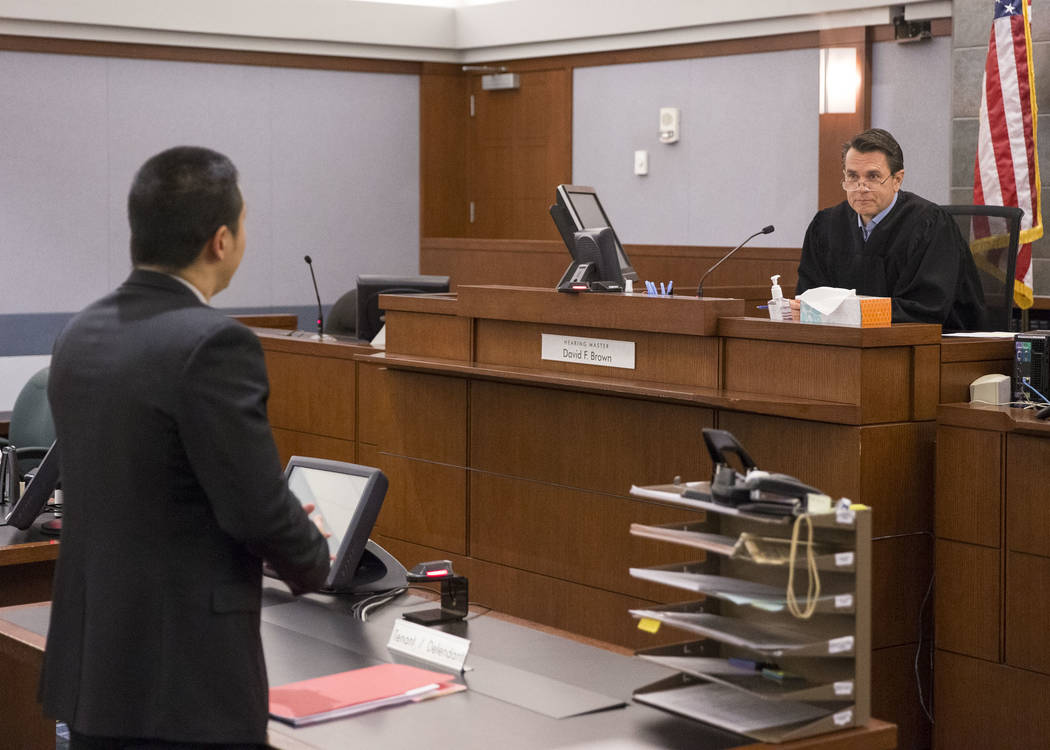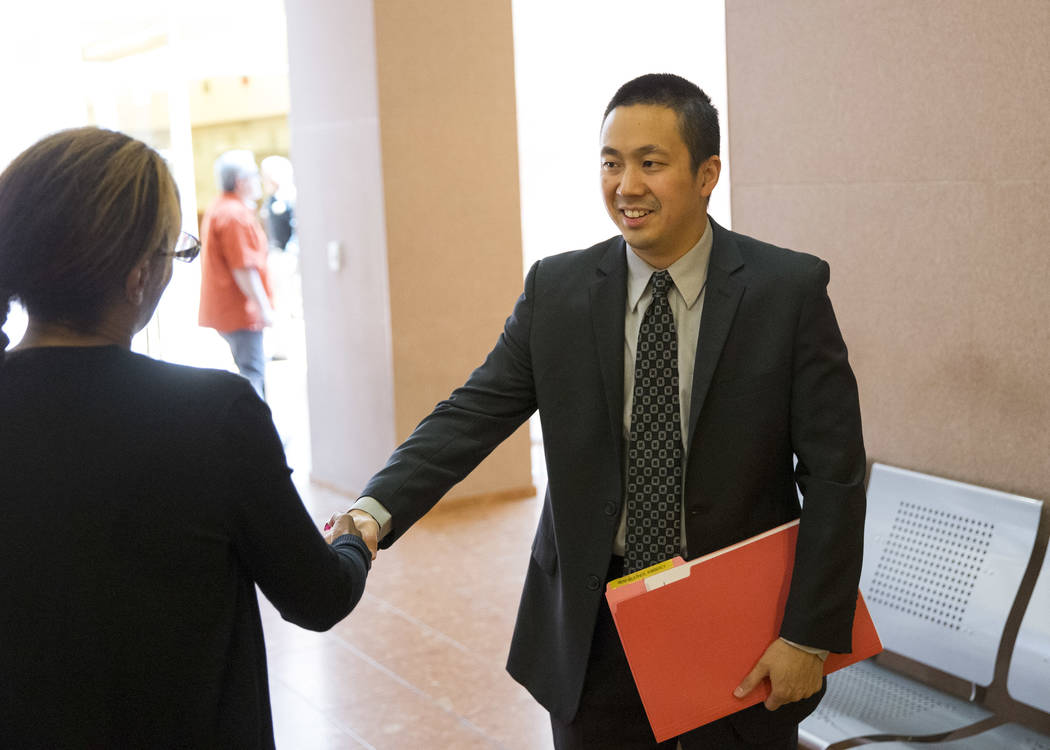Law firm says landlords’ fraud ignored in Las Vegas Valley




Landlords have forced some of Clark County’s poorest renters to pay thousands in fraudulent fees in recent years, but the government agency tasked with stopping the abuse has done little to investigate the accused.
Instead of receiving help from the Southern Nevada Regional Housing Authority, renters have turned to a nonprofit law firm for aid.
The nexus of the complaints is the federal housing choice voucher program, a subsidy formerly known as Section 8 that helps more than 11,000 very low-income families in Clark County lease privately owned homes. The local housing authority and landlord sign a contract that sets the rent, part of which the government pays.
Nevada Legal Services attorney Ron Sung has seen cases where voucher recipients have paid hundreds of extra dollars each month in unauthorized fees and rent increases. Tenants who refuse to pay can be threatened with eviction.
“These are private landlords who are preying on the poorest members of our community just for an extra buck,” Sung said. “Every landlord in the Section 8 program knows that if they are able to evict the tenant, then the tenant will lose their housing choice voucher. They rely on the voucher to avoid homelessness, and landlords use that as a sword of Damocles.”
Housing authority officials say they have not launched more investigations because they have not received complaints. That’s despite efforts to educate both tenants and landlords about what is deemed an illegal side payment.
“We can’t investigate if we don’t have the information,” said Brenda Fonseca, director of housing programs for the authority. “If we don’t receive information, what do we act on?”
Legal battles
Since 2013, Nevada Legal Services has filed federal lawsuits for eight families in the voucher program who claim they were charged illegal side payments.
North Las Vegas resident Lakeysha Holmes was charged $840 in unauthorized property management and homeowner association fees over the course of a year.
Christina and Jonathan Ellis forked over an extra $300 each month for almost two years to rent a three-bedroom home in Southern Highlands.
Norma Benitez paid an extra $197 a month for more than two years while renting a four-bedroom home in Summerlin. An employee for her property manager said the fees were for “sewer and trash” services.
“Since she worked with the government’s Section 8 program, I trusted her,” Benitez said in an interview translated from Spanish. “I never thought she would rob me.”
Lawsuits filed by Benitez, Holmes and the Ellises resulted in judgments totaling more than $500,000 in fines, damages and reparations. Other cases were settled for thousands of dollars, Sung said.
Many more are resolved without a lawsuit, Sung said.
“I’ve cut deals with landlords that we’ve promised not to blow the whistle on if they settled quickly with our clients,” he said. “They (voucher recipients) don’t have the resources to wait for these cases to take years in the courts.”
Investigations
Federal law gives housing authorities the power to disqualify landlords from participating in voucher programs if they charge illegal side payments.
That policy has never been exercised by the Southern Nevada Regional Housing Authority, the agency that has managed the voucher program in Clark County since 2010. When asked for specific examples of investigations into illegal side payments, housing authority employees could only point to one.
They launched an investigation into Benitez’s property manager and landlord, Golden River Realty and Galliano LLC, in February at the request of Nevada Legal Services. Investigators at a local law firm are reviewing the files of 44 families who are renting or have rented with the company since Jan. 1, 2016. The housing authority has deleted tenant files prior to that date.
“This case is in its infancy stage and information is still being gathered,” Parker, Nelson & Associates attorney Shana Weir wrote in an email.
But Sung said Nevada Legal Services has done the heavy lifting. The probe was announced days after a federal judge ordered Galliano LLC and Golden River Realty to pay more than $250,000 in damages and penalties.
“A federal judge has explicitly stated Benitez’s landlords committed fraud on the Section 8 program, so I don’t understand why there’s a delay in barring the landlords,” he said.
He’s also concerned that none of the other lawsuits have led to housing authority investigations.
Housing authority officials say tenants or Nevada Legal Services must file complaints directly with the agency. The authority has no complaints about illegal side payments for other companies Nevada Legal Services has sued.
“We’re in constant communication with them (Nevada Legal Services), so I’m just surprised they’ve been defending these cases and haven’t said anything,” said Amparo Gamazo, the housing authority’s interim executive director.
Sung said he and his colleagues have tried to instigate housing authority investigations before to no avail.
“Our experience with SNRHA is that we need to obtain court orders before SNRHA acts,” he said.
He pointed to a May 2013 email exchange between Fonseca and a Nevada Legal Services attorney, Kris Bergstrom.
In the exchange, Bergstrom asked for a landlord to be banned from the voucher program for charging illegal side payments. Fonseca replied that the housing authority could not take action.
“Was it proven in court that he (the landlord) was charging over the amount she (the tenant) was to pay? If so please forward that,” she wrote.
Different definitions
In two lawsuits, landlords and property managers have argued housing authority employees approved leases authorizing the companies to charge illegal side payments.
Yet another lawsuit casts doubt on whether housing authority employees have always understood what constitutes an illegal side payment.
Johnnie and Lana Mathis weren’t allowed to move into their Sunrise Manor rental in May 2013 until they signed a new lease requiring $150 a month in unauthorized pool maintenance fees, according to court documents. Seven months later, the couple was evicted.
The Mathises sued their landlord for charging illegal side payments. Sung said their complaint fell apart after housing authority employee Malandria Watson signed a letter stating she had told the landlord that charging pool maintenance fees was OK.
“That shot our case to pieces,” Sung said. The Mathises settled for $6,500.
In 2015 the housing authority updated its voucher program policies to specifically state pool fees are considered illegal side payments.
Sung said it is common for tenants to be confused about what landlords can and can’t charge.
Nevada Legal Services only discovered Benitez was being overcharged after Golden River Realty tried to evict her for nearly $6,000 in disputed late fees. If not for that kerfuffle, Benitez said she would have continued paying more than $2,000 in fraudulent charges each year.
“I tell people they have to be careful with the landlords,” she said. “They think because it has to do with the government, people have to remain silenced. It shouldn’t be like that.”
Contact Michael Scott Davidson at sdavidson@reviewjournal.com or 702-477-3861. Follow @davidsonlvrj on Twitter. Review-Journal staff writer Sandy Lopez contributed to this report.
Scams abound
Since 2013, at least six Clark County households in the Housing Choice Voucher program received money through settlements or judgments after suing their landlords for charging illegal side payments.
— Norma Benitez and the federal government were awarded a judgment of more $250,000 in January. Benitez paid $197 a month for sewer and trash fees for more than two years, according to a lawsuit filed in 2015.
— Lakeysha Holmes and the federal government received an $85,000 settlement in March 2017. Holmes paid $70 a month in property management and homeowner association fees for a year, according to a lawsuit filed in 2013.
— Johnnie Mathis received a $6,500 settlement in the summer of 2015, Nevada Legal Services reports. Mathis paid $150 a month in pool service fees for eight months, according to a lawsuit filed in 2014.
— Selina Lacey settled for $12,500 in February, Nevada Legal Services reports. Lacey paid an additional, unauthorized $125 a month for rent, according to a lawsuit filed in 2017.
— Johnathan Ellis, Christina Ellis and the federal government were awarded about $177,000 in February. The Ellises paid an additional, unauthorized $300 a month for close to two years, according to a lawsuit filed in 2016.
— Janie Smith settled for $25,000 in March 2017, Nevada Legal Services reports. Smith was charged an extra $100 each month during the second year of her lease, according to a lawsuit filed in 2015.
Problems with records
The Southern Nevada Regional Housing Authority’s record-keeping system makes it difficult to identify which landlords and property managers in the Housing Choice Voucher program have a history of complaints lodged against them.
That’s because the housing authority does not keep files on the companies it does business with. Instead, the government agency must check individual tenant files to determine if complaints have been made against a company.
The voucher program serves more than 11,000 families.
Complicating the matter, the U.S. Department of Housing and Urban Development requires housing authorities to keep tenant files for only three years following the tenant’s last day in the program. In practice, that period is even shorter in Southern Nevada.
SNRHA interim executive director Amparo Gamazo said all tenant files predating Jan. 1, 2016, have been shredded and expunged.
HUD spokesman Ed Cabrera said Wednesday that the department would examine the housing authority’s practices.
“HUD is looking into this matter and is prepared to work with the housing authority if indeed they are not in compliance with HUD regulations,” he wrote in an email.













